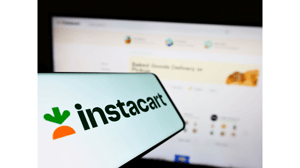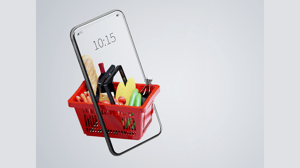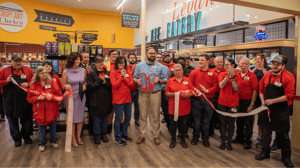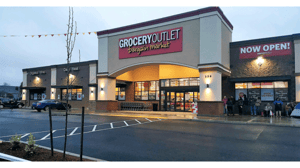SAINSBURY'S LAUNCHES FAIRTRADE COFFEE LINESAINSBURY'S LAUNCHES FAIRTRADE COFFEE LINE
LONDON -- Sainsbury's here has become one of the first major retailers to offer a private-label version of Fairtrade-certified coffee.Fairtrade coffee -- known as Fair Trade in the United States -- is made from beans purchased from growers that have been guaranteed a stable price, according to the Fairtrade Foundation, also here. Sainsbury's began selling Fairtrade products in 1994 and now offers
December 24, 2001
DAN ALAIMO
LONDON -- Sainsbury's here has become one of the first major retailers to offer a private-label version of Fairtrade-certified coffee.
Fairtrade coffee -- known as Fair Trade in the United States -- is made from beans purchased from growers that have been guaranteed a stable price, according to the Fairtrade Foundation, also here. Sainsbury's began selling Fairtrade products in 1994 and now offers biscuits, honey, chocolate, tea and sugar in addition to the coffee in its 383 stores, said a spokeswoman for the retailer.
Sales of these products have more than doubled over the past year, from $6 million U.S. to nearly $17 million U.S., she said.
"There is obviously the customer demand for Fairtrade products, so Sainsbury's felt it was the right time to introduce an own-label range, which in turn will help to benefit even more marginalized farmers," said the spokeswoman.
In the United States, numerous supermarket chains and other retailers carry branded Fair Trade coffee products certified by TransFair USA, Oakland, Calif. Among them: Raley's, Save Mart, Albertson's, Shaw's, Hannaford Bros., Roche Brothers, Stop & Shop, D'Agostino's, Heinen's, Harris Teeter, H-E-B, Fred Meyer, QFC, Whole Foods Markets, Wild Oats Markets and Long's Drugs.
Safeway, Pleasanton, Calif., started carrying a Fair Trade item from Seattle's Best Coffee, Seattle, last summer in its 1,400 stores. "We just wanted to provide an additional selection to customers," said Debra Lambert, spokeswoman. "We believe that some of our customers will want to purchase Fair Trade coffee to support the initiative that is involved with that product." She would not comment on sales trends.
"Supermarkets have a critical role to play in giving consumers the option to buy Fair Trade Certified coffee," said Paul Rice, executive director of TransFair USA. "More and more each day, consumers are demonstrating that, when given the choice, they prefer to purchase coffee that guarantees a fair price to the farmer. A profound price crisis is under way in the international coffee market, with prices their lowest ever in real terms," he said.
The volume of Fair Trade coffee has about doubled each year it has been offered, said Hilary Abell, development director of TransFair USA. It has grown from 1.9 million pounds in 1999 to 4.25 million in 2000 to an estimated 7 million to 8 million in 2001, she said. "We are going to move in the direction of having more products, but coffee is a good wedge product to open the door for the whole Fair Trade category. Coffee is the most established Fair Trade product in the world in every country where it is sold. We are now moving into tea and we expect to move into one or two other products in the coming year," she said.
Sales of Fairtrade products have been growing about 50% a year in Europe and are expected to reach $65.25 million to $72.5 million U.S., said Ian Bretman, commercial manager of the Fairtrade Foundation. While Sainsbury's is the first mainstream supermarket chain to embrace Fairtrade coffee, he noted that the 1,500 neighborhood cooperative supermarkets in the United Kingdom have carried it for about a year.
"This recognizes that Fairtrade is established in the mainstream retail market, which is what we have been working toward for the past 10 years or so," Bretman said. "Although Sainsbury's has been very supportive in terms of stocking the branded Fairtrade products over the years, this is another step forward in signaling that this is something customers are interested in," he said.
In a press statement, Liz Fullelove, socially responsible sourcing manager at Sainsbury's, said, "We began selling Fairtrade products in 1994 and were the first U.K. supermarket to do so. We hope that our own-label products, which will carry our brand and the Fairtrade Foundation's logo, will encourage more customers to support these marginalized growers and farmers."
Growers are paid at least $1.26 per pound of coffee beans, which is more than twice that of world market prices, which are now at a 30-year low, according to the Fairtrade Foundation. The Fairtrade coffee is priced comparably to premium brands of coffee, Bretman said.
Sainsbury's plans to expand its private-label Fairtrade offerings to decaffeinated coffee and chocolate, among other products. The retailer has no immediate plans to promote the Fairtrade coffee, the spokeswoman said, although it will be promoted in March in conjunction with a Fairtrade event that promotes the work of the foundation, she said.
"We predict that the interest in Fairtrade products will continue to grow as consumers become more aware of being socially responsible when they shop," she said.
About the Author
You May Also Like




